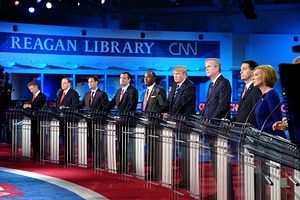It was game on as the gloves came off at the second Republican presidential debate. Under pressure to prove their potency, each candidate sought to up the ante. Amid the electrifying atmosphere at the Ronald Reagan Presidential Library in Simi Valley, California, sparks flew from turbo-charged retorts and rebuts, against a backdrop of President Reagan’s Air Force One – a symbol of U.S. presidential power. The debate delivered symbolism, showmanship, and substance in full force. Yet the absence of Asia was a glaring gap, even if the specter of China seeped into the debate. We share four ringside snapshots of observations:
China Specter. China poses a strategic challenge that nearly all candidates recognized in differing degrees. Scott Walker’s calling into question the White House’s rationale for Chinese President Xi Jinping’s upcoming state visit in light of China’s cyberattacks came across as political posturing rather than displaying a comprehensive understanding of U.S.-China relations. Rand Paul emphasized the importance of engaging directly and not being rash with China and Russia, and keeping lines of communication open. Jeb Bush affirmed the need to employ “offensive tactics” on issues as cybersecurity, but to use many tools in taking a strong stance toward China. Marco Rubio’s hawkish position on China accentuates his preference for a stronger U.S. global role.
Absence of Asia and U.S. Rebalance. Much-needed rigorous discussion on the future of U.S. policy in Asia, namely the U.S. rebalance, was eclipsed by immigration, the Islamic State, and radical Islamic terrorism. Whether the rebalance is to be renamed or repackaged, Republican candidates have yet to outline their respective approaches toward Asia – home to two-thirds of the world’s population and the world’s largest market of high net worth individuals (HNWIs). As an emerging area of market magnetism, innovation and growth, presidential candidates should define their framework for U.S. engagement with Asia.
Future of U.S. Foreign Policy. Outlining a vision of U.S. foreign policy under a Republican presidency was high priority for candidates. Marco Rubio, displaying an impressive grasp of foreign policy issues, convincingly made a case for strong, forward-leaning U.S. global leadership. Carly Fiorina’s command of military details, strategic thinking, and use of the Statue of Liberty as metaphor for American leadership suggested a future-focused, force-multiplying U.S. foreign policy. In rebuttal against criticisms of his father and brother’s national security approaches, Jeb Bush’s compelling retort that President George W. Bush kept the United States safe conveyed conviction that restoring strong U.S. leadership is urgently in order.
Presidential Leadership. The qualities and capacity of presidential leadership were an overarching theme in both sessions. Carly Fiorina’s fiery fortitude and command of foreign and domestic policy issues clearly won favor with the audience. Embracing a blend of humor – choosing a presidential code name of “Eveready” – and honor – telling Trump to apologize to his wife Columba Bush – with pragmatic policy proposals, Jeb Bush not only held his own, but boosted his stature. Chris Christie redeemed himself by consistently re-focusing the debate from candidate rivalry to the daily concerns of Americans. Meanwhile, Scott Walker was noticeably more animated than he was in the first debate, although his message was missing originality and vision. Despite coming into the second debate with strong poll standings, Ben Carson lacked the “logic” he so lauded in Reagan, repeatedly re-clarifying his policy positions on immigration and tax reform. And despite his savvy showmanship, Donald Trump’s slouched posture and smirks combined poorly with his bluster on serious foreign and domestic policy challenges. Meanwhile, the second-tier group of George Pataki, Bobby Jindal, Rick Santorum, and Lindsey Graham faced fewer opponents, but it is unlikely that any of them managed to give their flagging campaigns the boost they needed.
Mercy A. Kuo is an advisory board member of CHINADebate and was previously director of the Southeast Asia Studies and Strategic Asia Programs at the National Bureau of Asian Research. Angie O. Tang is Senior Advisor of Asia Value Advisors, a leading venture philanthropy advisory firm based in Hong Kong.

































